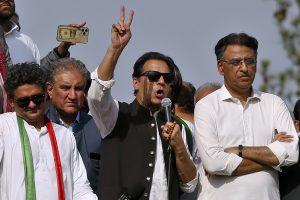Clashes between police and supporters of former Prime Minister Imran Khan erupted across several cities of Pakistan on Wednesday after the Pakistan Tehreek-e-Insaf (PTI) began its much-awaited long march to Islamabad. Across the country, police resorted to firing tear gas shells to disperse the protesters. In response to the police’s violence, PTI workers set fire to trees and police vehicles in the capital, forcing the government to call the military to protect the capital’s Red Zone, which houses important government buildings.
The political situation in Pakistan has gone from bad to worse as deadlock persists between the ruling coalition and the PTI over the issue of fresh elections. Khan, who is chairman of the PTI, has claimed that his government was removed from office as part of a conspiracy. After entering Islamabad on Thursday morning, Khan abruptly announced that he was ending his protest, saying that the government was taking the nation toward anarchy with its crackdown.
He issued the government an ultimatum. He would return to Islamabad with millions of people in in six days if fresh elections are not announced, Khan said.
Prime Minister Shehbaz Sharif says that Khan’s government was ousted via a constitutional process and it is the government’s prerogative to decide the timing of the next elections. Speaking in parliament after Khan withdrew his protest call, the premier said: “I want to clarify to the leader of this group, your dictation won’t work. This house will decide when to hold elections.”
Speaking with The Diplomat on condition of anonymity, a senior government official said that Khan was not able to mobilize a large number of people, meaning that had he gone ahead with the sit-in, the situation may have become embarrassing for the PTI chairman. Apparently, the military conveyed to Khan that it was better for him to leave the capital and allow the government to work, and that elections will happen at the right time.
Over the last few weeks, Khan has persistently asked the military leadership to intervene in his favor to resolve the crisis. In fact, he has been blaming the military for not helping him win the no-confidence motion against his government.
Some PTI leaders have gone as far as blaming the military for ousting Khan’s government. Shireen Mazari, a former human rights minister and senior PTI leader, recently criticized the military for its alleged role in Khan’s ouster. “Now everyone knows the neutrals were not actually neutral,” she said, going on to ask whether the military leadership was “part of the conspiracy to derail Pakistan on the economic and democratic front.”
Pakistan’s military appears to be divided over the question of Khan’s political fate. Whether one likes Khan or not, he does have a massive support base within the national security institutions whose rank and file remain opposed to the idea of bringing back to power parties like the Pakistan Muslim League-Nawaz (PML-N) and the Pakistan People’s Party (PPP).
Despite being ousted from power, Khan and his party have dominated the news cycle and the political narrative. This is thanks to the support they have received from the military’s ranks.
Arguably, Khan’s political position has benefited from the Sharif government’s inability to revive the stalled IMF bailout program. On Wednesday, Pakistan and the IMF concluded staff-level negotiations without reaching any decision as the latter linked the removal of fuel subsidies with the release of the next tranche.
While the government announced a hike in petrol prices on Thursday, it still remains to be seen if the IMF program can be revived as the fund is demanding further tough fiscal measures from the Pakistani government.
Khan may have withdrawn his protest call for now but rising inflation will continue to offer the PTI political leverage in the coming weeks.

































